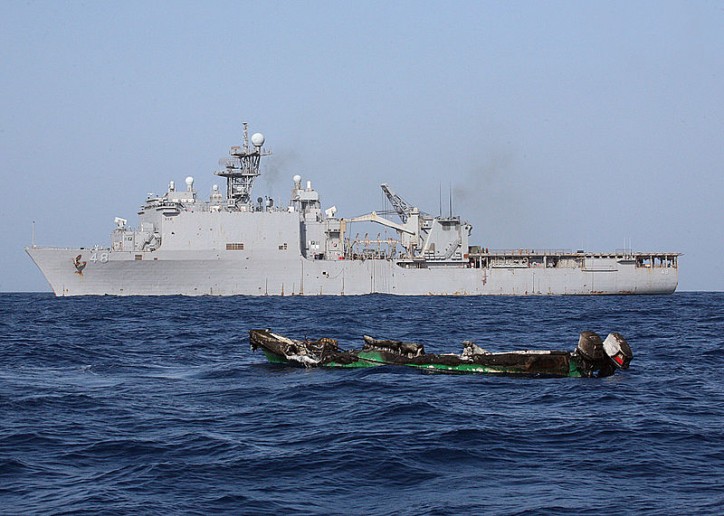A pair of Somali pirates were sentenced to life in prison Monday for their roles in a 2010 attack on the USS Ashland in the Gulf of Aden, while a third was given only 33 years because he cooperated with federal prosecutors in another piracy case.
U.S. District Judge Raymond Jackson begrudgingly issued the life sentences after the 4th U.S. Circuit Court of Appeals ruled last year that he erred by originally giving the five men convicted in the case sentences that ranged from 30 to 42½ years.

The burned out hull of a suspected pirate skiff drifts near the amphibious dock landing ship USS Ashland (LSD 48). Ashland while operating approximately 330 nautical miles off the coast of Djibouti, was fired upon and returned fire disabling a skiff manned by suspected pirates. Ashland deployed a visit, board, search and seizure team to rescue the suspects from the sea. U.S. Navy photo by Mass Communication Specialist 2nd Class Jason R. Zalasky/Released)
Piracy carries a mandatory life sentence under federal law, but Jackson had ruled it amounted to impermissible cruel and unusual punishment in the Ashland case because nobody boarded the amphibious dock landing ship and no U.S. sailors were injured in the attack.
“I didn’t harm anybody. I did not injure anybody. I did not rob anybody,” Abdi Razaq Abshir Osman said through an interpreter at Monday’s sentencing.
At the time, the Ashland was based in Virginia Beach. It was part of an international flotilla patrolling the area after a surge of piracy raids were launched from the largely lawless country of Somalia. Pirates routinely would attack and board commercial vessels, divert them to Somalia and then ransom the ships and their crews for tens of millions of dollars.
The incident with the Ashland began in April 2010 when seven men started out in a small skiff with the goal of capturing a merchant ship they could ransom. But in the early morning light they mistook the Ashland for a cargo ship and opened fire with an AK-47 assault rifle. The Ashland returned fire with its 25 mm gun, killing one of the men and causing the skiff to catch fire.
Jackson called the statutory sentence “harsh” and “totally unjustified” as he delivered the mandated life sentence to Osman.
“The court is fully aware you didn’t kill anybody, injure anyone,” Jackson said.
For his part, Jackson also didn’t believe the Ashland case initially amounted to piracy. That’s because the U.S. Supreme Court in 1820 defined piracy as robbery at sea and the Ashland was not robbed. The federal appeals court overruled him in 2012.
Mohamed Abdi Jama also received a life sentence later in the day and seemed confused as he spoke through an interpreter about why he was facing a harsher sentence than the one originally handed down.
“Is this a new crime I’m accused of? What is the issue here?” Jama asked.
Prosecutors requested what’s called a “downward departure” for the sentence of the third pirate, Mohamed Ali Said. Said cooperated with authorities in their case against another Somali who was accused of being a pirate negotiator. The negotiator was found not guilty of aiding and abetting piracy in 2013.
Two others convicted in the case are scheduled to be sentenced today. The other survivor from the skiff cooperated with prosecutors early on in the case and pleaded guilty in 2010 to lesser counts of attempting to plunder a vessel and two related charges.
The Ashland currently is based in Japan.
Source: Pilot Online